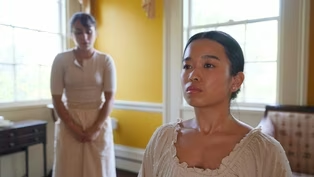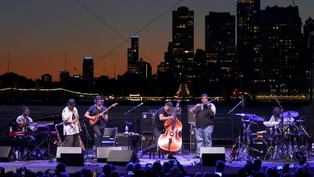State of the Arts
Mrs. Stern Wanders the Prussian State Library
Clip: Season 44 Episode 1 | 7m 33sVideo has Closed Captions
Mrs. Stern Wanders the Prussian State Library
In 1933, Hannah Arendt was arrested by the Nazis for conducting “illegal research.” A new play by Jenny Lyn Bader explores how a conversation between one of the most influential political thinkers of the 20th century and her captor led to her escape. "Mrs. Stern Wanders the Prussian State Library" was developed at Luna Stage in West Orange, NJ, where it returns after sold-out runs Off Broadway.
Problems playing video? | Closed Captioning Feedback
Problems playing video? | Closed Captioning Feedback
State of the Arts is a local public television program presented by NJ PBS
State of the Arts
Mrs. Stern Wanders the Prussian State Library
Clip: Season 44 Episode 1 | 7m 33sVideo has Closed Captions
In 1933, Hannah Arendt was arrested by the Nazis for conducting “illegal research.” A new play by Jenny Lyn Bader explores how a conversation between one of the most influential political thinkers of the 20th century and her captor led to her escape. "Mrs. Stern Wanders the Prussian State Library" was developed at Luna Stage in West Orange, NJ, where it returns after sold-out runs Off Broadway.
Problems playing video? | Closed Captioning Feedback
How to Watch State of the Arts
State of the Arts is available to stream on pbs.org and the free PBS App, available on iPhone, Apple TV, Android TV, Android smartphones, Amazon Fire TV, Amazon Fire Tablet, Roku, Samsung Smart TV, and Vizio.
Providing Support for PBS.org
Learn Moreabout PBS online sponsorship[music] Narrator: After sold out runs off Broadway, "Mrs.
Stern Wanders the Prussian State Library," a play by Jenny Lyn Bader returns to the theater where it first premiered -- Luna Stage in West Orange, New Jersey.
Dershowitz: We started doing it almost exactly a year ago, and it really felt, at least to me, like a historical piece and like a piece where my Judaism and my character's Judaism were very important.
And now, as the world has changed and things are happening to all sorts of people based on their backgrounds of all different kinds, based on their, you know, intellectual beliefs and what they're writing.
It feels like such a more universal human story and such a more modern story.
Narrator: The setting is a jail cell at police headquarters in Alexanderplatz, Berlin, early spring 1933.
Stern: Let me think.
Karl: No, you don't have to think.
Let me help you.
You are in the Prussian State Library.
Stern: Sure.
Yes.
I go there all the time.
Sorry, I didn't realize that would be of interest to the police.
Karl: The political police, yes?
We monitor national security and what people read.
Stern: Do you?
Karl: Mm-hmm.
And the words spoken in political groups, social clubs, sermons.
Stern: You listen to sermons?
Karl: We have five divisions and one of them just takes care of churches.
Stern: There's that much work?
Karl: Even the Lutherans must be watched.
One of us must listen to every sermon... Kreith: She was accused of doing research for the Zionists in the Prussian State Library.
One of the things that we have discussed about the title is that it contains a mystery.
For some people who don't know what the play is about, there's a moment halfway through the play where they understand the title for the first time.
Karl: So your book of love... Stern: On love.
Karl: ...you published it under a different name.
Stern: My maiden name, Hannah Arendt.
Bader: Spoiler alert, Mrs.
Stern is an actual historical figure.
It's Hannah Arendt.
She was married to Gunther Stern, and so she would have been Mrs.
Stern.
She's one of the most influential political thinkers of the 20th century.
She coined the term totalitarianism in her book "The Origins of Totalitarianism," which has been in print for decades and became a bestseller again a few years ago.
She famously covered the trial of Adolf Eichmann for The New Yorker in a series of journalistic pieces she wrote which were then combined into a book called "Eichmann in Jerusalem: A Report on the Banality of Evil."
She wrote more than 30 books.
And you know her ideas continue to reverberate.
Erich: We were just concerned, as some of our people were also arrested when we heard about the charges against you.
Hirshfield: There's a few moments when Mrs.
Stern seems to try to get Erich the lawyer, to acknowledge the severity of -- of the political situation at hand.
And he doesn't -- he doesn't really cop to it.
Stern: The Nazis want chaos.
Erich: If they want chaos why would they create more laws?
Stern: Allow me to explain it to you.
Laws are like fences.
Erich: Exactly.
The law sits in a fixed spot.
You know where it is, and you can take refuge there.
Stern: Until it moves.
Terror begins when the law starts moving from place to place.
They are attacking the law itself.
Moving the fence.
Putting a few people outside of it until we reach a point where anyone can be put outside the fence, whether or not they are guilty.
Bader: Here's somebody being interrogated by the Gestapo.
She's in a Gestapo cellar.
She's been arrested by the secret police.
She's later going to write a book on the origins of totalitarianism.
What if she's figuring that out right now.
One thing she talks about in "The Origins of Totalitarianism" is in a classic dictatorship.
You know, there are these decrees, but in totalitarianism you change the law, you change it back, you change it again.
You start to make people question the whole idea of the law.
The idea of 1933 is something I really, really got much more immersed in over time working on this play, because it was a really a moment of transition.
Every week something new would happen.
Karl: I write the file, and there are so many things that you could be charged with, yet none seems exactly right.
Stern: So many things I could be charged with?
Dershowitz: I think there are a few moments, especially in our scene, where I feel like we're almost explicitly in conversation with the audience.
Like one of them is when I say the line, you know, you say-- Erich: We live in complicated times, Mrs.
Stern.
Stern: They are certainly unprecedented.
Isgitt: I think that that is a crisis we're seeing today, is where people are having to evaluate the difference between law and morality, maybe in a way they never have had to think about it.
And I saw the Nazi soldier struggling with that a lot, as he was very new at it.
That was the part that resonated with me the most, was his character.
Karl: What I liked best about the other job is that it was easy to avoid mistakes, but now I worry that if I make an error-- Stern: It's a lot of responsibility for you, the responsibility of judgment.
And right now you need to be careful.
It will not get easier.
Temple: He does find this conversation stimulating, and I don't think he's stimulated like this in his day-to-day job.
So, like, she shows like a certain kind of love that he, you know, did not expect to see.
Karl: It's hard to live with someone who is depressed.
Flores: He wanted to be loyal to to his party, but at the same time he had that fight, that inner battle where he wanted to say, "You know what?
I believe you."
Narrator: Mrs.
Stern, Hannah, finds herself with a choice whether to trust the rule of law or to escape the country by any means necessary.
Erich: Have you not been listening?
You need to leave Germany.
Stern: But you said you didn't believe in the forced emigration.
Erich: I'm not forcing you.
I'm advising you, as a friend would, to go for your own good, Hannah.
Narrator: It's a true story.
She did escape, and it was only possible because of the friendship she formed with her captor.
Hoffman: I would like to think that people can connect that way.
And maybe we will.
Maybe we will.
It's all about whether or not people can actually listen to each other.
Kreith: It is a footnote in history, but also a deeply relevant and to me, deeply inspiring footnote in history.
Because really, what it invites us to think about is how we forge relationships across seemingly unbridgeable divides.
Stern: I thank you.
[ Music plays ]
The Moving Architects: Where She Once Stood
Video has Closed Captions
Clip: S44 Ep1 | 7m 38s | A dance by The Moving Architects focuses on the Crane House and YWCA in Montclair. (7m 38s)
Stanley Clarke: The Trajectory of Jazz
Video has Closed Captions
Clip: S44 Ep1 | 8m 14s | Legendary bassist Stanley Clarke and his band dazzle an audience on the Camden waterfront. (8m 14s)
Providing Support for PBS.org
Learn Moreabout PBS online sponsorship
- Arts and Music
The Best of the Joy of Painting with Bob Ross
A pop icon, Bob Ross offers soothing words of wisdom as he paints captivating landscapes.













Support for PBS provided by:
State of the Arts is a local public television program presented by NJ PBS


